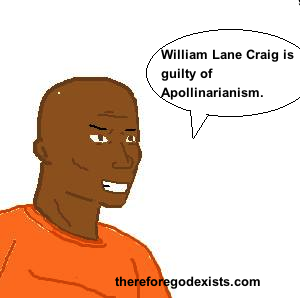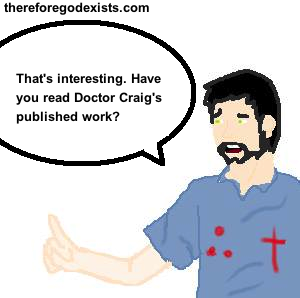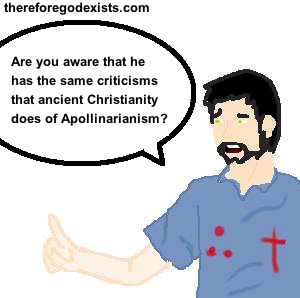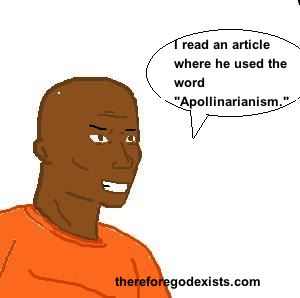 Gossip is a feature of the world from which Christians are called to abstain. For we cannot spread rumors about people, attribute statements to them, and misrepresent them, especially without knowledge and behind their back. When we do that, we are guilty not only of our own sin, but of enticing others to do it as well, because they heard the information from you, and now they are spreading it to other people. You acquired your information in the same way that they did, by hearing someone else spread it, but nobody checked the information to see if it was accurate. People just gleefully continue to gossip about this individual. Doctor William Lane Craig has been victimized by this flawed approach to research. Abuzz in the schoolyard and the hallways are Doctor Craig’s Christological positions. Many are asking the question, “Does William Lane Craig have an orthodox Christology?” But, without consulting Doctor Craig’s work, they answer “No,” purely for the sake of gossip.
Gossip is a feature of the world from which Christians are called to abstain. For we cannot spread rumors about people, attribute statements to them, and misrepresent them, especially without knowledge and behind their back. When we do that, we are guilty not only of our own sin, but of enticing others to do it as well, because they heard the information from you, and now they are spreading it to other people. You acquired your information in the same way that they did, by hearing someone else spread it, but nobody checked the information to see if it was accurate. People just gleefully continue to gossip about this individual. Doctor William Lane Craig has been victimized by this flawed approach to research. Abuzz in the schoolyard and the hallways are Doctor Craig’s Christological positions. Many are asking the question, “Does William Lane Craig have an orthodox Christology?” But, without consulting Doctor Craig’s work, they answer “No,” purely for the sake of gossip.
 Most will base their research on a quick google search, prompted by something that somebody else said. Upon hearing that Doctor Craig is an advocate of Neo-Apollinarianism, they will do a google search of Neo-Apollinarianism, quickly see the flaws therein and the reasons that it was rejected as heresy, and apply these views to Doctor Craig. Many folks (particularly of the Reformed camp) are eager to call Doctor Craig a heretic. They are eager to accuse him of denying the incarnation, or denying that Jesus had an actual human body, or anything else that they can think of. The internet has rendered this form of malevolent gossip especially potent, for in a matter of seconds, hundreds of people can see false accusations being made against the brethren, based on information that does not appeal to Doctor Craig’s primary work on this subject. Throughout this article, I will provide information that should acquit Doctor Craig of all of the charges of heresy, citing his volume Philosophical Foundations For A Christian Worldview (all page numbers will be taken from that).
Most will base their research on a quick google search, prompted by something that somebody else said. Upon hearing that Doctor Craig is an advocate of Neo-Apollinarianism, they will do a google search of Neo-Apollinarianism, quickly see the flaws therein and the reasons that it was rejected as heresy, and apply these views to Doctor Craig. Many folks (particularly of the Reformed camp) are eager to call Doctor Craig a heretic. They are eager to accuse him of denying the incarnation, or denying that Jesus had an actual human body, or anything else that they can think of. The internet has rendered this form of malevolent gossip especially potent, for in a matter of seconds, hundreds of people can see false accusations being made against the brethren, based on information that does not appeal to Doctor Craig’s primary work on this subject. Throughout this article, I will provide information that should acquit Doctor Craig of all of the charges of heresy, citing his volume Philosophical Foundations For A Christian Worldview (all page numbers will be taken from that).
William Lane Craig affirms the full deity and humanity of Jesus.
Doctor Craig has not retreated to self-autonomy, deciding what doctrines he likes and what he dislikes. He is not spoiling the Christian faith by denying the incarnation of Jesus. He is not denying the classical creeds nor the ancient Council of Chalcedon. Rather, in Philosophical Foundation For A Christian Worldview, he begins his chapter titled “The Incarnation” by saying “The New Testament affirms both the humanity and deity of Jesus Christ,” (page 597). He expounds upon this by appealing to the great Council of Chalcedon, not to critique it, but to establish its’ theological outline as the boundaries within which he is developing his Christological model. He writes, “[The Chalcedonian formula] does not seek to explain the Incarnation but sets up as it were, channel markers for legitimate christological speculation. Any theology of Christ’s person must be one in which the distinctness of both natures is preserved and both meet in one person, one Son, in Christ.” (page 601).
 Critics, then, are left squirming to determine where it is that Doctor Craig could be considered to maintain Christological heresies. After all, he is working within the confines of the orthodox confession of faith. Does William Lane Craig have an orthodox Christology? His Christology begins with the full deity and humanity of Jesus. However, if a person were to charge him with heresy, they would probably appeal to what they call Apollinarianism.
Critics, then, are left squirming to determine where it is that Doctor Craig could be considered to maintain Christological heresies. After all, he is working within the confines of the orthodox confession of faith. Does William Lane Craig have an orthodox Christology? His Christology begins with the full deity and humanity of Jesus. However, if a person were to charge him with heresy, they would probably appeal to what they call Apollinarianism.
William Lane Craig has the same reservations and criticisms of Apollinarianism.
People who seek to charge Doctor Craig with heresy will, as I said, do a google search of Apollinarianism and then apply the inherent shortcomings to Doctor Craig. This is a very simplistic and unsympathetic approach, for Doctor Craig is not aligning himself with Apollinarianism in an identical manner. Indeed, anybody who reads his published work (his critics do not read it), will discover that he affirms the criticism that the church has of this Christology.
He writes, “Nevertheless, Apollinarianism was inadequate as it stood. Two deficiencies of Apollinarian Christology seemed especially serious. First, a body without a mind is a truncation of human nature… Second, if Christ lacked a human mind, then he did not redeem the human mind.” (Page 599) He goes on to empower this criticism, writing, “Unfortunately, Apollinarianism was radically defective as it stood. For a complete human nature involves more than a hominid body, so that on Apollinarianism’s view of the Incarnation was really a matter of the Logos’s assuming, not humanity, but mere animality…. [His] opponents rightly charged that such a view undercuts Christ’s work as well as his person, since Christ did not have a truly human nature, but only an animal nature, and so, could not have redeemed humanity.”
Does William Lane Craig have an orthodox Christology? Well, Doctor Craig, seems to present parallel misgivings to Gregory of Nazianzus. His criticisms of this Christological view are probably surprising to the Calvinists who attributed it to him. That is why it is important to ensure that you read the original source of the person who you are criticizing. As faithful Christians, we cannot just say things and hope that they are true. We need to give people a fair hearing.
William Lane Craig is combatting Nestorianism.
Throughout his treatment on the Incarnation, Doctor Craig is concerned that many of the views that are outlined imply or logically precede Nestorianism. Nestorianism is the view that within Jesus Christ, there are two persons, one being the Logos, his spiritual nature, and the other being the human being. If there are two natures, one being divine, and the other being human, how is it that there could not be two persons? He writes, “The church seems in danger of dividing the person of Christ,” (page 602). Of course, this logical quagmire does not cause Doctor Craig to retreat to the position that there are two persons. He is outlining some of the logical tension that Christians have to deal with. It is not intellectually satisfying to just throw up our hands and say that it is a mystery. If we do that, then, when somebody comes along and proposes Nestorianism, our non-solution of appealing to mystery will quickly unravel. If an Arian were critiquing the Incarnation, by saying that it logically entails Nestorianism, our non-solution and anti-intellectualism will be exposed.
While many do resign themselves to this form of anti-intellectualism, surely they will not condemn people who continue to explore this. These are legitimate philosophical questions. How is that two natures does not entail two persons? Moreover, how is that two wills do not entail two persons? After all, if there is one almighty will (the Logos), and one human will, how would that not entail two persons? Indeed, that notion seems to force us to depart to a form of modalism, where the Father is identical to the Logos, and he possesses the almighty will, while the Son is merely a human being, and he possesses the human will. As you can see, we are teetering on the borders of heresy. The question is, how can we remain soundly within the confines of the Chalcedonian Council, and provide good answers to these questions?
Does William Lane Craig have an orthodox Christology? His work on this issue seems to be driven by the agenda to provide orthodoxy with good answers to these questions. It would be unacceptable to resign ourselves to mystery or to heresy. Doctor Craig is laboring to that end.
William Lane Craig provides a possible Christological model.
His work is precisely meant to resolve the tension related to Nestorianism outlined above. He wants to explain how it is that there could be two natures, and not two persons. While Apollinarius tried to solve this problem, Doctor Craig rejects this explanation for the same reason that historic Christianity rejected it. But, appreciating the intellectual fervor and the unique, compelling resolution offered by Apollinarius, he asks, “Can we appropriate Apollinarius’s insight without falling into his errors? Let us see.” So, Craig’s model is not strict or classical Apollinarianism. It is a revised form of Apollinarianism. In fact, Craig seems to imply the possibility that Apollinarius’s opponents misunderstood him, and so, the criticisms lodged against this view are based on a faulty understanding.
He writes, “Apollinarius may have been misunderstood when his critics charged him with giving Christ a truncated human nature. When Apollinarius argued that the Logos was not only the image of God but also the archetypal man, and in this latter sense, already possessed human nature in his preexistent form, his opponents, like Gregory of Nazianzus understood him to mean that the flesh of Christ was pre-existent. Apollinarius may have been more subtle than this. What he may have meant is that the Logos contained perfect human personhood archetypically in his own nature. The result was in assuming a hominid body the Logos brought to Christ’s animal nature just those properties that would serve to make it a complete human nature. … This draws support from the doctrine of man as created in the image of God. Human beings do not bear God’s image in virtue of their animal bodies, which they have in common with other members of the biosphere. Rather, in being persons, they uniquely reflect God’s nature. God is personal, and inasmuch as are persons we resemble him. The Logos already possessed in his preincarnate state all of the properties necessary for being a human self. In assuming a hominid body, he brought to it all that was necessary for a complete human nature.” (page 608-09).
In response, someone might be inclined to say that this model suggests that the mind of Jesus was not actually human, for the Logos is omniscient. To this, Craig replies, “We suggest what William James called the “subliminal self,” is the primary locus of the superhuman elements in the consciousness of the incarnate Logos. Thus Jesus possessed a normal human consciousness, but it was underlain, as it were, by a divine consciousness. This understanding of Christ’s personal experience draws on the insight of depth psychology that there is vastly more to a person than waking conscious. The project of psychoanalysis is based on the conviction that some of our behaviors have deep springs of action of which are only dimly aware, if at all. … Similarly, the incarnation, at least during his state of humiliation, the Logos allowed only those facets of his person to be part of his waking consciousness which were compatible with the typical human experience, while the bulk his knowledge and other cognitive perfections, like an iceberg beneath the water’s surface, lay submerged in his subconscious. On the model we propose, Christ is thus one person, but in that person, conscious and subconscious elements are differentiated in a theologically significant way,” (page 610-11).
While Apollinarius’s original model suffered from the detrimental flaw of removing human personhood from the human mind, Craig’s revised version submits that the Logos did have a perfect human mind. Doctor Craig points out that this “nullifies the traditional objections lodged against Apollinarius’s formulation,” (page 609).
How should William Lane Craig’s critics react?
Those who accuse Doctor Craig of the same Christological heresy as common critics of Apollinarius render will find this information to be foreign. As I said, many of those who criticize Craig have never read his work on the incarnation. In response to this new information, you may find yourself disagreeing with Craig’s revised version or understanding of Apollinarianism. But, this model cannot be indicted with the same heresy as the original understanding of Apollinarianism has suffered from. Indeed, it asserts that the human person, Jesus of Nazareth, does have a complete human mind. If you think that logically, this model entails that he does not, remember that Craig is asserting that he does. This means that you can accuse him being inconsistent (as a result of the logical entailments of his view), but not heretical, (for he does not follow those alleged logical entailments to their conclusions). Does William Lane Craig have an orthodox Christology? He falls right in line with the ancient Council of Chalcedon. His model does not suffer from the same flaws as what most call Apollinarianism. If we are going to accuse someone of heresy, and start gossiping about it, we need to ensure that we have good information.
Christians who have not heeded wisdom, and slandered Craig in this way, should employ self-reflection and begin to ask what they want their future role in ministry to be. They need to aim to develop maturity, and to repent of this behavior. If they have publicly called Craig a heretic for this reason, I would call them to publicly repudiate their comments and repent.
If you would like to get in on the discussion about this, join my Theology Discussion Group!
